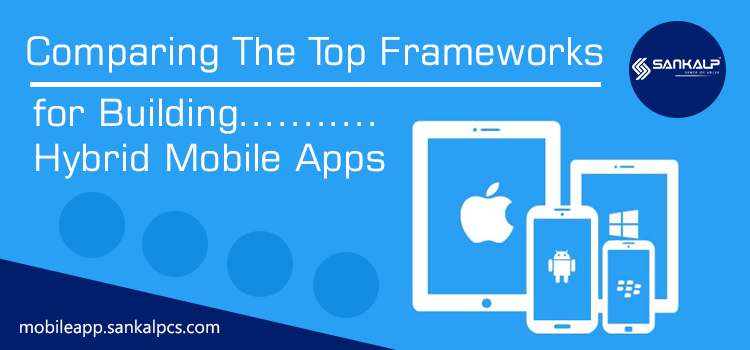What are hybrid mobile apps?
A hybrid app is a mobile-optimized website packed in a native wrapper. They bear the characteristics of a native app as well as a web app. Hybrid apps are developed using technologies such as Java, HTML, and CSS. The principal advantage of hybrid app development is that the developer has to write a single code that can run on multiple platforms. However, this generally happens at the cost of performance of the application in a different environment. To mitigate the shortcoming, the engineers have developed many frameworks for hybrid app development. Let’s compare them by considering their advantages and disadvantages.

Comparison between the top frameworks
Xamarin utilizes Microsoft technology stack for hybrid app development that uses C# for developing apps for all mobile app platforms. The apps based on Xamarin can be compiled natively thereby giving a native look and feel.
Pros:
- Owned by Microsoft, one of the biggest tech giants
- Allows to share 90% of the code across significant platforms
- Reduced development costs
- Open source tool
- Performance at par with native apps
- Suitable when minimal platform specific functionality is needed
Cons:
- Subscription needed for Professional and Enterprise licenses
- Supports specific components that are available only in its library
- Quality of integration may get affected as the complexity of code increases
PhoneGap is an open-source, cross-platform framework. Based on Cordova framework, PhoneGap uses CSS3, HTML5 and JavaScript.
Pros:
- Requires basic skills
- A simple framework
- High level of compatibility
- Can access device’s hardware
Cons:
- Apps do not give a feeling of native
- Two or more plugins are needed to support one task
- User interface widgets are missing
The Ionic framework is the leader in mobile app development with a strong market presence. It utilises HTML, CSS, and JS for development.
Pros:
Powered by the vast community
Comprises of many useful features
JS enables the development of robust mobile apps
A low cost and low maintenance option
Reuses up to 98% of the code
Supports simple as well as corporate apps
Works on predefined elements
Cons:
Complexity can only be incorporated through JS
Specific skills set is needed
For additional features are available with the paid version
Framework 7 is an agnostic framework for building iOS and Android apps. The developer should know CSS, HTML, and JavaScript to create an app using Framework 7.
Pros:
Does not depend on external tools
Contains numerous features and user-interface widgets
Can develop complex apps with native look and feel on its own
Customizable
Superior performance
Cons:
Lower market presence
Does not contain a tool for emulation and app packaging
Compatible with selective mobile platforms
Onsen UI is simple to use, flexible open source framework.
Pros:
Numerous ready to use components and web-based UI elements
Free to use for commercial projects
Responsive layout
Comprehensive documentation with many examples
Compatible with jQuery and Angular JS
Cons:
A niche solution trying to acquire market presence. Grab more info.







Add comment